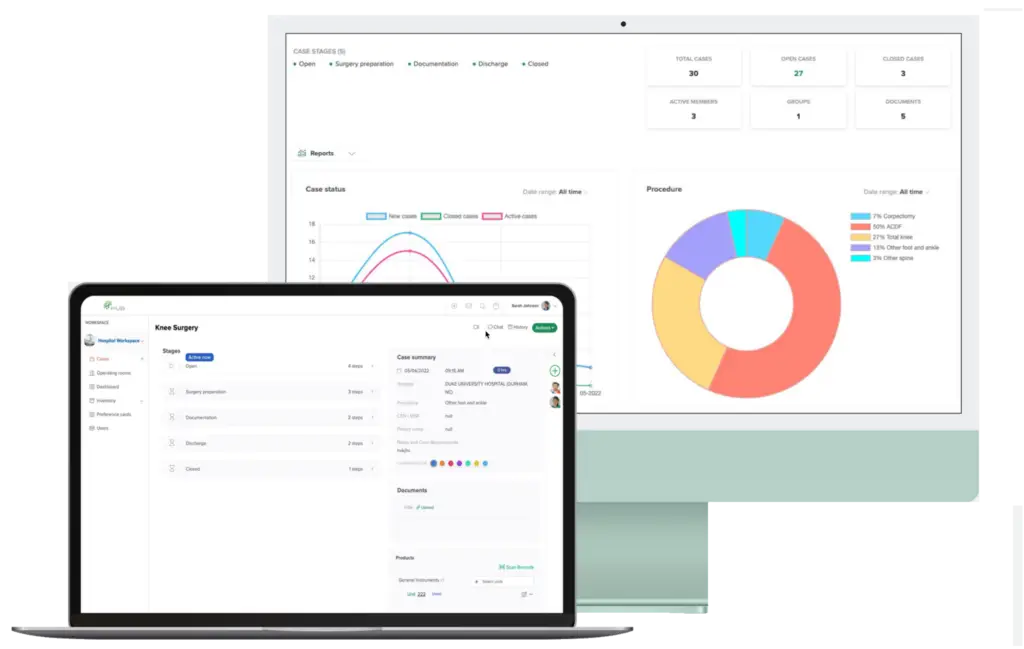The healthcare industry is constantly evolving, and the COVID-19 pandemic has dramatically increased the demand for medical supplies. This surge has put a significant strain on the supply chain and logistics involved in medical supply distribution. To meet the growing demand and ensure efficient delivery, healthcare organizations are turning to innovative solutions. Here are some strategies to optimize the supply chain and improve healthcare logistics.
Automated Inventory Management
Managing inventory is one of the biggest challenges in medical supply distribution. With numerous products and fluctuating demand, maintaining adequate stock levels is complex. Automated inventory management systems provide a solution by using advanced technologies such as RFID tags and barcode scanning to monitor inventory in real-time. These systems enable better forecasting and ensure that supplies are available when needed, reducing the risk of shortages and overstocking.
HUB Healthcare offers robust automated inventory management solutions, allowing healthcare organizations to streamline their inventory processes, reduce human error, and ensure timely restocking of essential supplies.
Supply Chain Optimization
Optimizing the supply chain is crucial to meet the increasing demand for medical supplies. Streamlining processes and reducing inefficiencies can ensure timely delivery. Implementing a just-in-time (JIT) inventory system is one effective method. JIT minimizes excess inventory and waste by delivering supplies only as needed. Additionally, using data analytics and predictive modeling can identify areas for improvement, optimize delivery routes, and enhance overall supply chain efficiency.
HUB Healthcare integrates advanced data analytics to help healthcare providers identify inefficiencies and optimize their supply chain operations, ensuring a smooth and responsive logistics network.
Collaborative Distribution
Collaborative distribution involves partnering with other healthcare organizations to share resources and reduce costs. Smaller healthcare facilities, in particular, can benefit from this approach as it allows them to manage their supply chains more effectively by pooling resources. Collaborative distribution can help negotiate better deals with suppliers and reduce the risk of shortages, ensuring a steady supply of medical products.
Technology Integration
Integrating technology into the supply chain significantly improves efficiency and reduces costs. A transportation management system (TMS) can optimize delivery routes and lower transportation expenses. Additionally, customer relationship management (CRM) systems can track orders and enhance communication with healthcare facilities. By utilizing these technologies, medical supply distribution becomes more streamlined and cost-effective.
HUB Healthcare offers comprehensive technology solutions that include TMS and CRM systems, enabling healthcare organizations to manage their supply chains more efficiently and improve communication with suppliers and customers.
Outsourcing Logistics
Outsourcing logistics to a third-party provider can be a viable solution for medical supply distribution. These providers specialize in supply chain management and possess the resources and expertise to handle the complexities involved. By outsourcing logistics, healthcare organizations can focus on their core operations while leaving supply chain management to experts.
HUB Healthcare collaborates with leading logistics providers to offer seamless outsourcing solutions, ensuring that medical supplies are delivered efficiently and reliably.
Conclusion
To meet the growing demand for medical supplies, healthcare organizations must optimize their supply chains and improve logistics. By implementing automated inventory management, optimizing the supply chain, adopting collaborative distribution, integrating technology, and considering outsourcing logistics, organizations can ensure timely delivery of supplies and reduce costs. As the healthcare industry continues to evolve, staying updated on the latest technologies and strategies is essential for maintaining a competitive edge.
For more detailed information on using HUB Healthcare, visit our Help Center.
HUB Supports:
- Medical Imaging: Future Trends and Insights
- Coordinated Care: Synergy for Global Reach
- Care Coordination: Distributors: The Critical Link
- Healthcare Analytics: Leveraging healthcare analytics and IoT for smarter supply chains
- Integrated Healthcare: Distributors: The Critical Link
- Communication in Healthcare: Value-added services like training, installation, and maintenance
- Clinical Pathways: Challenges and Opportunities
- Care Coordination Platform: The Role of Platforms like HUB Healthcare
- Medical Inventory Management: Supply chain management
- Healthcare Communication: Staying updated with industry trends
- Medical Case Management Software: Tools and resources for better market analysis
- Compliance Management System: Ensuring regulatory compliance
- Patient Management Software: Integration
- Healthcare Document Management: Tools and resources for better market analysis






